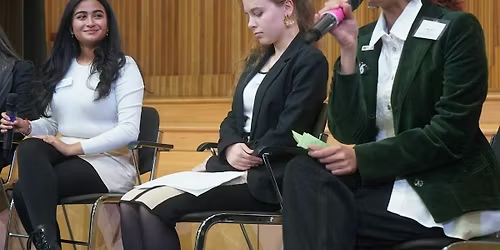Making in Biomed Symposium
Schedule
Mon Oct 27 2025 at 09:00 am to 07:00 pm
UTC+00:00Location
The Francis Crick Institute | London, EN

About this Event
The extended abstract deadline is the 1st October 2025. We strongly encourage junior researchers, engineers and those with work in progress to apply for a talk or poster using this link.
The Making in Biomed Symposium is organised by the Crick Making Science Technology Platform, Imperial College London, and UCL London Centre for Nanotechnology (LCN). It will bring together people, ideas and activities focusing on engineering development to tackle biological challenges from both the Crick, Imperial, UCL and partner universities, and the wider research community.
Participants will include experts from our founding institutions, the wider UK research ecosystem, and international collaborators. Through open dialogue, shared challenges, and cross-disciplinary exchange, we hope to establish a dynamic network that inspires novel applications, fosters translational projects, and accelerates progress. This initiative will also highlight ongoing engineering projects, shared resources, and collaborative opportunities—laying the foundation for a sustained, idea-driven community built to tackle biology’s most pressing questions.
The conference topics include, but are not limited to:
microfluidics, biomaterial, tissues engineering bioprinting in-vitro modelling, organ on chip, micro and nano manufacturing, system engineering, electronics, programming, automation, robotics, applied in various fields from cell development, mechanobiology, cancer research, neuroscience, biochemistry.
Keynote: Professor Hagan Bayley is the Professor of Chemical Biology at the University of Oxford. He received his B.A. in chemistry from Oxford in 1974, while at Balliol College, and his Ph.D. in chemistry from Harvard University in 1979 in the laboratory of Jeremy Knowles. After postdoctoral work with Gobind Khorana at the Massachusetts Institute of Technology, he was on the faculty at Columbia University and the University of Oxford. From 1988 to 1996, he was at the Worcester Foundation for Experimental Biology in Shrewsbury, Massachusetts, and from 1997 to 2003 at Texas A&M University in College Station.Professor Bayley’s laboratory pioneered the engineering of membrane proteins. His work has contributed to our understanding of these proteins, and especially to their use in biotechnology, including the development of a variety of single-molecule applications of protein pores for stochastic sensing and biopolymer sequencing. In 2005, Hagan founded Oxford Nanopore Technologies, which developed the MinION for the nanopore sequencing of DNA and RNA.Recently, Hagan’s laboratory has explored the application of three-dimensional printing and related technologies for the fabrication of both synthetic tissues and living tissues.Professor Bayley was the 2009 Chemistry World Entrepreneur of the Year. In 2011, he was elected a Fellow of the Royal Society. In 2012 he was awarded the Royal Society of Chemistry's Interdisciplinary Prize, in 2017 the Menelaus Medal of the Learned Society of Wales and in 2019 the Mullard Award of the Royal Society. In 2018, Professor Bayley held the Kavli Chair at the Delft University of Technology. In 2023, he received the Royal Society Buchanan Medal.
Keynote: Professor Keith Mathieson is a distinguished physicist specialising in neural interfaces and neurophotonics. Earning his BSc and PhD degrees in Physics from the University of Glasgow in 1997 and 2001, he was elected a Fellow of the Royal Society of Edinburgh in 2024.He holds a Royal Academy of Engineering Chair in Emerging Technologies at the University of Strathclyde, a prestigious 10-year appointment extending until 2029. His research centres on developing advanced brain-interfacing technologies, working with neuroscientists to further our understanding of neural circuits and their alterations due to neurological disorders. This has led to systems that can help restore function. In particular, he has been working on retinal implant technologies to restore vision to patients with degenerative retinal conditions. His publication record includes pioneering work on photovoltaic retinal prostheses and optogenetic control using high-density neural probes.Professor Mathieson recently formed the , a pioneering centre drawing together engineers, physicists, neuroscientists and AI specialists focussed on developing advanced neural interface technology. This has been supported by funding from the Royal Academy of Engineering, the Wolfson Foundation and alumni donors.
For further information, please contact [email protected]
Sponsors
We would like to thank the University Partnership Networking Fund for supporting this event.
We would also like to thank our commercial sponsors for their continued support- Durham Magneto Optics, Cairn Research, A-gas, Thorlabs, Additive-X, Hamilton, Bico and Eden Microfluidics and Microfluidic Systems.
Provisional program
09:00-10:30 Session 1
10:30-11:00 Refreshment break
11:00-12:30 Session 2 and Keynote
12:30-13:30 Lunch and poster session
13:30-15:00 Session 3
15:00-15:20 Refreshment break
15:20-17:00 Session 4 and Keynote
17:00-19:00 Drinks reception and poster session
Where is it happening?
The Francis Crick Institute, 1 Midland Road, London, United KingdomEvent Location & Nearby Stays:
GBP 0.00












